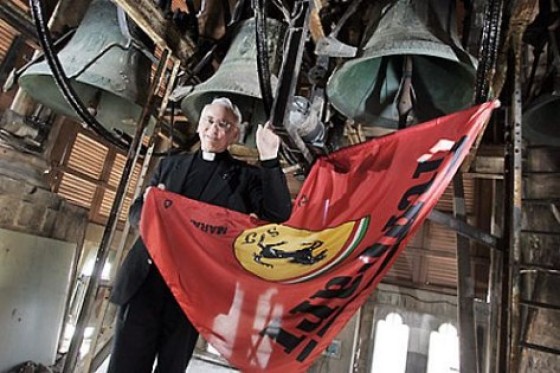Why Ferrrari Banned Floyd Mayweather
Justin Bieber, Kim Kardashian, and Floyd Mayweather are no longer allowed to buy a new Ferrari. They are all on a blacklist of people that Ferrari no longer sells to. The trio have insulted Ferrari because they didn’t treat the cars with the necessary respect.
Bieber, for example, repainted his Ferrari, put a rear spoiler on it, and carelessly left it on some street after a party. Ferrari hates it when owners don’t respect their wishes, as, according to them, owning a Ferrari is representing the brand. Homemade modifications are generally frowned upon, and do not even think about reselling your car within the first year after buying it.
That’s also why Floyd Mayweather was banned. He likes to change his cars frequently. All this might sound crazy, but it is part of the reason why Ferrari outperforms almost all other car makers on the stock market.
Covid, climate, and semiconductors. While the car industry is under immense pressure from the current crisis, the Ferrari stock didn’t seem to care. It turns out that Ferrari has mastered a strategy that only a few companies have. It all starts in a small town in northern Italy.
Not your usual car maker?
Whenever Ferrari wins a Formula 1 race, the local pastor rings the church bells in Maranello, the home of the Ferrari brand. In 2019, the bells were rung three times. The two years after, it remained completely silent. Those were not the most glamorous years for the team. But surprisingly, the Ferrari stock seemed pretty much unaffected.

Not only by the results in Formula 1 but also by all of the other madness that was going on worldwide. The Ferrari stock just kept going up while other car companies struggled.
Since going public, the stock gained 350 per cent. It is easy to see why: Ferrari sold more and more cars. Expensive cars: according to a 2018 study, Ferraris cost an average of 280,000 euros. But the margin is even more remarkable. Per car, Ferrari makes 69,000 euros in profit. No other manufacturer comes close. That crazy profit margin is already a hint that Ferrari is doing something different. Ferrari does not think of itself as a car manufacturer, but as a luxury brand.
What difference does that make? A big one, when you look at the stock market. An important indicator on the stock market is the price-earnings or P/E ratio. It tells investors how much a company is worth and if it is overvalued or undervalued. The calculation is easy: share price divided by earnings per share. It’s easier to understand with an example.
At the end of 2021, Ferrari had a P/E ratio of nearly 50. That means that if earnings stayed constant it would take 50 years to recoup the share price. Fifty years is a very long time, so a P/E ratio of 50 is a very high value, especially for a car manufacturer. Just look at the P/E ratios of other car brands. Compared to those, the Ferrari stock seems to be overvalued.
Investors are either assuming a glorious future with much higher earnings, or they see Ferrari as a low-risk investment, even in times of crisis. And this is where it gets interesting. Because usually, car companies struggle in those times. This was the moment the WHO announced that we were living in a pandemic.
July 2021 was the hottest month ever recorded. But while the World Climate Conference was held and CO2 emissions were restricted, the production of internal combustion cars was running hot at the Ferrari factory. And while all other carmakers struggled to produce at the end of 2021 because of the lack of semiconductors, Ferrari reported a 90 per cent increase in sales.
Ferrari seemed unaffected by the world’s situation and was a safe bank during the pandemic. Obviously, they have an incredibly luxurious situation. Because you can’t just buy a Ferrari, there are waiting lists. And the price basically doesn’t matter. Ferrari can simply pass on the higher material prices to the customers.
Just as other luxury brands like Hermés or Rolex do. Ferrari is positioned as a luxury goods manufacturer and that also explains the incredibly high valuation. Look at the P/E ratio of other luxury brands. Ferrari clearly falls into that cluster, and not that of the other car brands. As a car manufacturer, Ferrari would not have established such a high market valuation.
Ferrari’s Brand Strategy, Explained
But how did they achieve that unique position? If you want to create a luxury brand, simply selling expensive products is not enough. You need reputation, exclusivity, and often tradition. Rolex, for example, is proud of its sporting achievements like sponsoring the first woman to swim the English Channel and today has a strong connection to tennis and golf. Ferrari is the most successful racing team in Formula 1 and also the only car brand that’s been in F1 since the beginning. From the start, Enzo Ferrari and all of the cars after him stood for “Racing.” Competing in F1 wasn’t so much about selling more cars. It was the other way around.
Ferrari established the idea that they are selling cars to finance their Formula 1 team. So practically everyone who bought a Ferrari became part of the Ferrari team and supported the vision of making sports cars even better. This creates a special community and exclusivity.
A large part of Ferrari’s business is actually not selling cars, but merchandise! Wearing a Ferrari hat or shirt makes you feel part of a very exclusive and successful community even if you don’t own a Ferrari. This feeling of exclusivity is also ensured by limiting the number of cars sold and the unique way they are distributed.
Here is an example. There was a limited number of the Ferrari model “Daytona SP3.” 599 pieces. Even before the model was officially presented, all cars had already been sold for around two million euros each. But it’s not first-come, first-serve. Buyers have to “qualify” for the car. There’s even a saying: “You don’t choose Ferrari. Ferrari chooses you.” To buy such a noble model like the Daytona, you should have “earned” one.
Having several Ferraris already in your garage helps, as long as you have shown that you treat the cars well. Only go to Ferrari dealerships. Show up at Ferrari events. Basically, love the Ferrari brand and never show up with a Lamborghini. And do not paint Nyan-Cat on your car and call it Purrari – Ferrari might sue you.
Speaking of Lamborghini, apparently, Ferruccio Lamborghini owned a Ferrari but didn’t like the clutch so he decided to go to Enzo and suggest how he could improve the car. Enzo told him to ‘go away’ and ‘stick to the tractors.’ Lamborghini was so pissed he started his own company! A brilliant example of Ferrari’s arrogance… or let’s say confidence. It’s also reflected in their sales agreements.
They include a minimum holding period of one year because Ferrari does not want the cars to become objects of speculation, but only serve the most loyal customers. You can compare it to other goods with more demand than supply. Just look at concert tickets for famous musicians. Tickets are often completely sold out after five minutes. And after six minutes you can buy the same tickets for twice the price on eBay.
That’s neither good for the artists nor the fans, but only for the sellers on the black market. The same thing would happen with Ferraris. In this sense, Ferrari’s rules can be compared to personalized tickets. Only those who buy the product should use or own it.
Owning a Ferrari seems to be like having a guaranteed long-term investment. Of course, you can also drive your investment…or race with it through Monaco.
Innovation and Sustainability
Ferrari understands very well that exclusivity, innovation, and sustainability must coexist in a balanced way as it looks to the future. Ferrari is making significant investments in cutting-edge technology and eco-friendly business methods all the while upholding its status as a luxury brand.
The development of electric and hybrid automobiles is one important area of concentration. Ferrari is to launch its first fully electric vehicle by 2030 in response to growing emission laws and worldwide environmental concerns. The company will also be expanding its array of hybrid automobiles.
Ferrari is dedicated to sustainability in many ways than just its vehicles. The organization is additionally advancing in lowering its carbon footprint through the adoption of more environmentally friendly production techniques. For example, Ferrari is implementing circular economy ideas to reduce waste and investing in renewable energy sources for its production facilities.
Apart from its scientific and environmental endeavors, Ferrari persistently pioneers innovations in performance and design. Future models from the firm are expected to push the limits of automobile engineering by fusing cutting-edge technology with the classic power and grace for which Ferrari is renowned.
Ferrari hopes to maintain its position as a leader in the automotive industry for many years to come by continuing to push the boundaries of innovation while upholding its core principles of exclusivity and elegance. Ferrari’s capacity for adaptation and development will be essential to preserving both its unmatched market price and the allegiance of its devoted clientele as times change.
The Future?
This is not a call to invest in Ferrari.
Being a public company can be tricky, especially when your success depends on exclusivity. Rolex, for example, is still not public but owned by a foundation. Public companies need to make their shareholders happy.
That means they always need to grow and ideally sell more. But the more cars you produce, the harder it gets to stay exclusive. On the other hand, since the church bells in Maranello started ringing more often again, Ferrari doesn’t have to worry about the future. The city can probably afford golden church bells by now.

A seasoned software engineer with more than eleven years of experience who writes about news and international topics on the side. Afolabi, who holds a degree in Electrical/Electronics Engineering, combines technical know-how with a sharp awareness of global events to offer a distinctive analytical viewpoint to his work. Afolabi is the one to turn to for perceptive commentary on world affairs.
